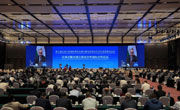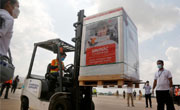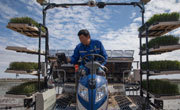Why have elderly internet celebrities caught public attention?
Recently, due to her interest in live-streaming and desire for becoming an internet celebrity, "Grandma Hu Meng" in the TV series "80’s and 90’s Generations" received much attention. On a social media platform, a related topic of "how do you feel about elder people becoming internet celebrities" recorded almost 100 million page views.
When elder people make news for becoming internet celebrities, this indicates the unusualness of this phenomenon. While TV shows are a reflection of social life, in real life, not just in the trendy group of internet celebrities, even in the entire online world, there are few elderly figures. Their voices are weak, with no audiences, they are completely marginalized in the internet world.
Elder people used to be the center in their families and in society overall. The kindhearted Mother Jia in "Dream of the Red Chamber" and the strict Grandfather Gao in "Home" have absolute authority in family affairs. However, as of now, elder people not only are weak in the virtual online world, they have gradually become vulnerable in family and social lives.
This transition went through a long and complex process divided by agricultural civilization--rural customs society and industrial civilization-- urban legalized society. The former stressed tradition and stability, where elder people held more advantages. The latter highlights innovation and change, which makes youths more advantageous. In brief, traditional agricultural production relies heavily on climate, season, phenology, and labor experiences. Experiences accumulated by elder people and the skills they mastered became critical resources that are valuable. The governance and operation of rural customs society also relies heavily on tradition, customs, ethics, and moral authority. These resources of governance depend on a seniority hierarchy, which actualizes intergenerational transition.
Industrialization brought about a civilizational paradigm distinct from tradition. In industrial production, scientific knowledge occupies the core position, and economic development relies heavily on scientific and technological progress. Industrial production reorganized social structure, urbanization broke down rural communities, and law replaced customs, which became the core norms for social governance and operation. During this process, young people gradually achieved an advantageous position in a society that centers on scientific knowledge, innovative ability, and adjusting to highly volatile social rules. Ultimately, they replaced the elderly and became the essential group and backbone of society.
This transition affects all aspects of society. The lifestyle and ideology of elder people are outdated with society's rapidly changing rhythm. As the newest achievement of the industrial civilization of science and technology, the internet, digital technology, and artificial intelligence created even more difficulties for elder people. An elder person who does not know how to use a smartphone will have difficulty getting around in today’s city. However, scientific advancement and civilizational progress should bring greater inclusion. If a digital culture excludes the large population of elder people, make them feel repressed and alienated, then this flaw needs remedy and improvement.
Creating a technical environment friendlier towards elder people and building a social environment more adaptable for them should become a societal consensus. Technology and society should offer more inclusion to elder people, make them enjoy the convenience of technology, participate in more aspects of social life, and share the welfare brought about by industrial and urban civilization.
Author: Feng Shouyan, media commentator
[ Editor: JYZ ]










More From Guangming Online
Medics from Fujian leave for Shanghai to aid in battle against COVID-19 resurgence
New int'l land-sea transport service to Indo-China Peninsula launched
Another makeshift hospital under construction in Shanghai
Tourists view tulips in Suiping County, Henan
In pics: blooming gagea flowers on grassland in Zhaosu, Xinjiang
Greek workers stage 24-hour general strike over high prices